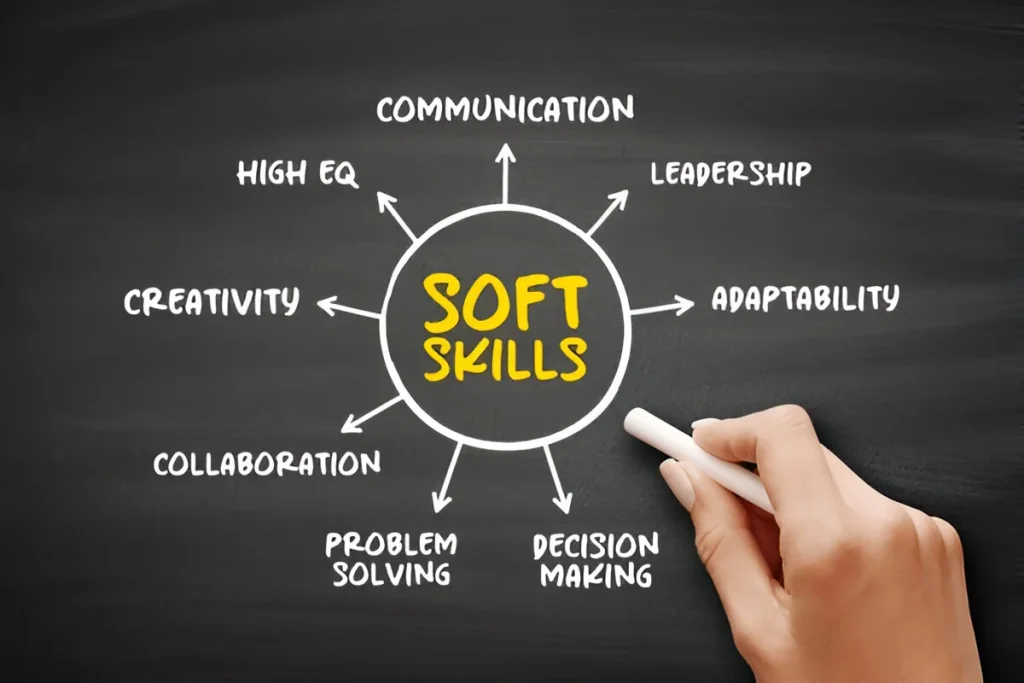
20 August, 2025
Why Soft Skills Matter in competitive exams today goes beyond test performance—learn how mastering them can shape success with guidance from a reputed coaching center.
For decades, competitive exams have been associated with long study hours, stacks of books, and endless practice tests. While academic preparation remains the backbone of success, the landscape of learning has changed. Today, success is not only about answering correctly but also about how you present yourself, manage stress, communicate ideas, and adapt under pressure.
This is where soft skills step in. Whether you’re preparing for a commerce stream examination, an entrance test, or even an interview round, your ability to balance knowledge with interpersonal and behavioral skills can set you apart from thousands of other aspirants.
Soft skills are often described as the non-technical abilities that define how you interact with others, manage situations, and showcase your personality. In exams, especially those with group discussions, interviews, and personality tests, these skills often weigh as much as, if not more than, technical expertise.
Some reasons they’ve gained importance include:

Imagine two candidates with equal academic knowledge. One is hesitant, struggles to articulate ideas, and falters under stress. The other confidently communicates, remains calm under pressure, and demonstrates problem-solving ability. The second candidate has a clear advantage.
Academic skills may get you through the written test, but soft skills ensure you excel in the final selection stages.
The ability to convey your thoughts clearly, whether verbally or in writing, is critical. From interviews to essay writing, communication defines first impressions.
Understanding and managing your emotions—as well as empathizing with others—is vital. It reflects maturity and composure, qualities examiners value.
Competitive exams are as much about speed as accuracy. Learning to balance preparation with breaks, revision with practice, and answers within strict time limits showcases discipline.
Many modern competitive exams test analytical and reasoning abilities. Soft skills like critical thinking help students approach problems differently and stand out.
An interview panel can gauge your readiness not just from answers but from posture, eye contact, and tone. Confidence often conveys competence.
Exams are stressful by nature. The ability to remain flexible and handle unexpected challenges reflects resilience—an underrated but essential skill.
While the immediate goal is cracking the exam, the real value of soft skills extends far beyond results. They:
The student who hones both technical knowledge and soft skills doesn’t just clear an exam—they prepare for life-long success.
Balancing hard study schedules with soft skill development may seem overwhelming, but it’s achievable through small, consistent steps:
A holistic approach doesn’t just prepare you for exams—it prepares you for the challenges of modern professional life.
Education boards, corporate recruiters, and exam boards are aligned on one thing: knowledge without adaptability is incomplete. A candidate who memorizes answers but cannot express opinions or adjust to unexpected shifts may find themselves at a disadvantage.
The reality is simple—soft skills are the bridge between preparation and performance.
While self-learning is powerful, structured mentorship can accelerate progress. Educational mentors today understand that preparing students is not just about books, but about shaping personality and confidence.
Institutions like Acharya Dronacharya Classes, known as the Best Commerce Class in Jaipur, integrate this philosophy. Their approach combines academic excellence with personality development, communication practice, and confidence-building—making sure students are prepared for every stage of competitive exams.
This holistic balance is why so many achievers today vouch that the right mentorship makes all the difference.

Yes. Many exams include interviews, group discussions, or situational assessments where soft skills are evaluated as much as academic performance.
Soft skills can definitely be learned and improved with consistent practice, mentorship, and self-awareness exercises.
Even 15–20 minutes daily of focused activities like journaling, speaking practice, or role-play exercises can create noticeable improvements.
All students benefit, but commerce students particularly stand out when they combine financial or analytical knowledge with strong communication and presentation skills.
Structured coaching not only teaches academic concepts but also creates opportunities for group discussions, presentations, and confidence-building exercises that polish soft skills.
In the evolving landscape of competitive exams, subject knowledge is only half the journey. The other half is built on interpersonal, behavioral, and adaptive skills that define how you present yourself. This is why soft skills matter more than ever.
When paired with the right academic preparation, they don’t just help you crack an exam—they help you shape a successful career.
And with the guidance of trusted mentors, students can achieve a balance between technical expertise and personality development.
In the end, it’s not only about what you know, but also about how you showcase it. Success belongs to those who can master both.

27 January, 2026

24 January, 2026

21 January, 2026

16 January, 2026

8 January, 2026

31 December, 2025